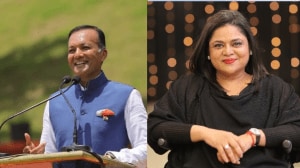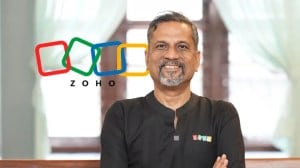By Faizal Khan
In early June this year, four writers from India and England sat in a hall at the Christ’s College in Cambridge to launch a new literary festival in the United Kingdom. Next to the auditorium of the Yusuf Hamied Centre was the college’s courtyard where stood a statue of famous Indian scientist Jagdish Chandra Bose, who discovered how plants responded to the environment in the late 19th century. Incidentally, the new literature festival in Cambridge was from a picturesque hill town in the foothills of the Himalayas called Kasauli in Himachal Pradesh known for its evergreen fir and pine trees.
The Khushwant Singh Literature Festival (KSLF), Kasauli made a quiet entry to Cambridge on June 5, expanding its footprint from Himachal Pradesh to the famous British university town that dates back to the early 13th century. Among the participating authors were Keshav Guha, author of the 2019 novel Accidental Magic, British-Indian author Mihir Bose, British-Pakistani writer Noreen Masud and former British diplomat and current master of Christ’s College, Cambridge, Simon McDonald, the author of Beyond Britannia: Reshaping the UK Foreign Policy.
“We were in Cambridge for the first time,” says writer-journalist Rahul Singh, the son of Khushwant Singh, who inspired the KSLF in Kasauli, a town built during the British Raj, a decade ago. “This was a campus where Charles Darwin, the father of the theory of evolution, and Jagdish Chandra Bose lived,” beams the Mumbai-based Singh, an alumnus of the King’s College, Cambridge. “It was a great moment to have taken our small festival to Cambridge.”
Allure of India
The presence of the KSLF in Cambridge this year reflects a new beginning for Indian literature with literary festivals becoming the country’s latest cultural export to the world after a renewed interest in yoga in the West in recent years. While it was the first edition of the KSLF in Cambridge this year, the festival has had six editions in London before, first at the King’s College London and later at the School of Oriental and African Studies (SOAS), University of London. The KSLF and the Jaipur Literature Festival (JLF), which set up a London edition in 2014 before expanding to the United States, Canada, Spain and the Maldives, are leading a trend that combines an organic response to a growing global interest in writing in Indian languages and a slick marketing strategy to create global brands from the country like the Hay Festival of Literature & Arts in Wales did for British culture more than a decade ago. The arrival of JLF and KSLF in England adds to the prominent British literary festivals like the Hay, Henley, Cliveden, Cheltenham and Harrowgate.
“Literature has ascended as a pivotal facet of Indian soft power by advancing cultural diplomacy and fostering global intellectual exchanges,” explains Sanjoy K Roy, managing director of Teamwork Arts, which produces the annual JLF editions in Jaipur and outside the country. “Both the annual festival in Jaipur and the International editions of JLF provide a prestigious platform for a diverse array of renowned speakers, thereby facilitating profound debate and dialogue. This inclusivity, encompassing multiple languages and regional voices, allows India to present a multifaceted cultural narrative, thereby enhancing its global image and influence,” adds Roy.
The recent international successes of translations from Indian languages, including the International Booker Prize 2022 win for Hindi writer Geetanjali Shree’s Tomb of Sand, translated from the original Ret Samadhi by Daisy Rockwell, and the award’s longlist appearance of Tamil author Perumal Murugan’s Pyre (Pookuzhi), translated by Aniruddhan Vasudevan, last year are helping draw audiences abroad to Indian literary festivals.
“That some of our festivals are unfolding abroad, taking Indian books and writers to the international stage, is just wow. For bookworms in search of soulmate books, a lack of borders is welcome,” says author-editor Shinie Antony, director of the Bangalore Literature Festival. “Indian Writing in English is very young, only a few decades old, while most of our old literature from every inch of India is a buried treasure that we can keep on discovering. We have got our translation act together at last and now our stories are everywhere,” adds Antony.
Healing the world
There are many factors that draw foreign audiences to Indian literary festivals. One is the historical and cultural diversity of India. Another relates to new styles of storytelling by contemporary Indian authors. “The allure of Indian literature to international audiences stems from its profound historical and cultural diversity,” explains Roy. “Indian literary works frequently explore universal themes such as identity, migration, social justice and human resilience, which deeply resonate with global readers. Contemporary Indian authors introduce innovative storytelling techniques and fresh perspectives that captivate literary enthusiasts worldwide,” he says.
The vast and influential Indian diaspora has helped too. After the KSLF moved to London six years ago, Yusuf Hamied, the chairman of Indian pharmaceutical giant Cipla, called Singh to suggest a KSLF edition at Cambridge, Hamied’s alma mater. “Yusuf Hamied was a friend of my father’s,” says Singh. “He is one of the benefactors of Christ’s College and there is an auditorium named after him,” he adds. Hamied and wife Farida were present at the festival along with Christ’s College master McDonald, who participated in a session on the state of the world.
For a Western audience, an Indian literary festival offers a vast platform of authors from the subcontinent. “It is a meeting of minds of people from the subcontinent,” says Singh about KSLF’s London and Cambridge editions, themed ‘Heal the World’ this year. “There are so many writers of Indian and Pakistani origins who live abroad, mainly in the United Kingdom and the United States. We try to invite them to our festivals. They all write in English and that is the meeting ground for so many writers from India,” he adds. At KSLF London, held during the general elections, among the speakers was former chief election commissioner S Y Quraishi, the author of India’s Experiment With Democracy: The Life of a Nation Through Its Elections, who assured a packed audience at SOAS about the sanctity of ballots through electronic voting machines. Introducing the opening session of the Cambridge edition was Pakistani historian Fakir Aijazuddin, a former culture minister of Punjab province and former chairman of Lahore Museum.
“Fakir Aijazuddin’s ancestors served in the court of Ranjit Singh, the erstwhile king of undivided Punjab in the early 19th century. When my father passed away in 2014, Aijazuddin took his ashes to Hadali in Punjab, Pakistan, where he was born and built a plaque at the school he attended to commemorate him,” recalls Singh. The plaque read: ‘A Sikh, a scholar and a son of Hadali Punjab. This is where my roots are. I have nourished them with tears of nostalgia.’
“In fact, the KSLF goes out of its way to have a mix of Pakistani and Indian authors in an effort to bring the two countries together. This is something Khushwant Singh always wanted to do,” says London-based journalist Amit Roy, one of the participants at KSLF London and Cambridge this year. “One of the big draws at JLF London this year was Mishal Husain, who was born in the United Kingdom of Pakistani parents and is now a celebrity BBC presenter. In her book, Broken Threads: My Family From Empire to Independence, Mishal talks about how her grandparents born in the early part of the 20th century—Mumtaz Husain and Mary Quinn on her father’s side and Syed Shahid Hamid and Tahira Butt on her mother’s—had their lives overturned by the Partition. Sandhurst-trained Hamid served as private secretary to Claude Auchinleck, commander in chief of the British Indian army, and later became the first director-general of Pakistan’s Inter-Services Intelligence,” adds Roy.
Building global brands
Will other major literature festivals in the country follow in the footsteps of JLF and KSLF and launch their own editions abroad? It is too early to say. While the Apeejay Kolkata Literature Festival and the Tata Literature Live! in Mumbai have grown in stature over the years with strong programming and audience and won’t mind becoming a global brand, the Mathrubhumi International Festival of Letters (MBIFL) in Thiruvananthapuram, Kerala would be an ideal candidate if it decides to venture out, possibly to the Middle East where the newspaper has several editions in the Gulf countries. If it happens, the Kerala Literature Festival in Kozhikode, recently named the City of Literature by Unesco’s Creative Cities Network, could follow suit. “As for us travelling out, there are no plans yet, mainly because this is a community festival and therefore very specific to the city. Right now only the Bengalurean reader is on our mind,” says Bangalore Literature Festival’s Antony.
There are many challenges that the newcomers seeking global brands for their domestic literary festivals would seek to overcome. “Indian literary festivals abroad are not a quintessential representation of Indian languages,” says author Sabin Iqbal, curator of MBFIL. “We need to take regional writers from Hindi, Tamil, Bengali, Malayalam, Kannada, Marathi and other languages to the Indian literary festivals abroad,” adds Iqbal.
Global footprint
Here’s a list of Indian litfests held abroad, & the years they began:
2014: JLF London (UK)
2015: JLF Houston (US) and KSLF London (UK)
2019: JLF New York (US) and JLF Toronto (Canada)
2022: JLF Soneva Fushi (Maldives)
2023: JLF Valladolid (Spain)
2024: JLF Seattle (US), KSLF Cambridge (UK), and JLF North Carolina (US): To be launched
Faizal Khan is a freelancer









